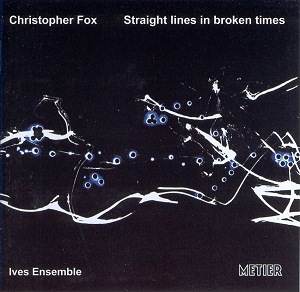Currently Professor
of Composition at Huddersfield University,
Christopher Fox's impressive credentials
include teaching at Darmstadt between
1984 and 1994. His questing intellect
has enabled him to extend boundaries
for his music, including a piece (Strangers
in our midst) for cello, street
musicians and surveillance video.
It was while at Darmstadt
that Fox encountered the Ives Ensemble,
which features here; intriguingly, he
wrote a 45-minute 'realisation' of Stockhausen's
Plus-Minus for them! The Ives
Ensemble play supremely well right from
the beginning of the minimalist-tinged
Straight lines in broken times2;
too minimal for this listener.
The fine recording might be too much
in-your-face for some listeners although
this seems to be a favoured balance
for music based on only occasionally
varied repetition. Fox uses scale fragments
as his chosen material. The raised '2'
in the title refers to this as a sequence
of works of the same title, of which
this is the second; they are not meant
to be played together. The moments that
tend towards jazz are perhaps the most
successful.
Etwas Lebhaft
is dedicated to the memory of Webern.
A Lontano commission, it moves from
a raspberry-like opening to a distinct
processional. I suspect the microtones
are more rewarding to play than they
are to listen to – the ending is, however,
mightily impressive, its delicacy tinged
by the preceding dissonances.
The most extended work
is the Themes and Variations
– the double plural is intentional and
the title pays homage to Cage. Fox collects
some of his favourite things into six
interconnected movements. Seeing themes
as 'fields of possibilities', he begins
with a warmth that points to Ives rather
than Cage. A special word needs to go
to the agile, clear bassoonist - Jan
Willen van der Ham - who shines in this
work. A bell invokes ritual for the
second movement, 'A bout de souffle'
(a Godard tribute), before 'Intersections'
pays its own homage to Feldman and Satie
(allegedly), although I hear more Stravinsky
than Satie here. Still, there is much
mystery here before the glacial string
quartet - comprising violin, viola,
cello and double-bass - of the final
moments. This is by far the best piece
on the disc.
Reeling functions
as an encore. It is the first piece
in which Fox used quarter-tones. The
initial clarinet scream comes as quite
a shock after the end of Themes and
Variations, and leads to a fun piece
that is almost a game in music.
A mixed reaction, then
– but Themes and Variations is definitely
worth a go.
Colin Clarke


